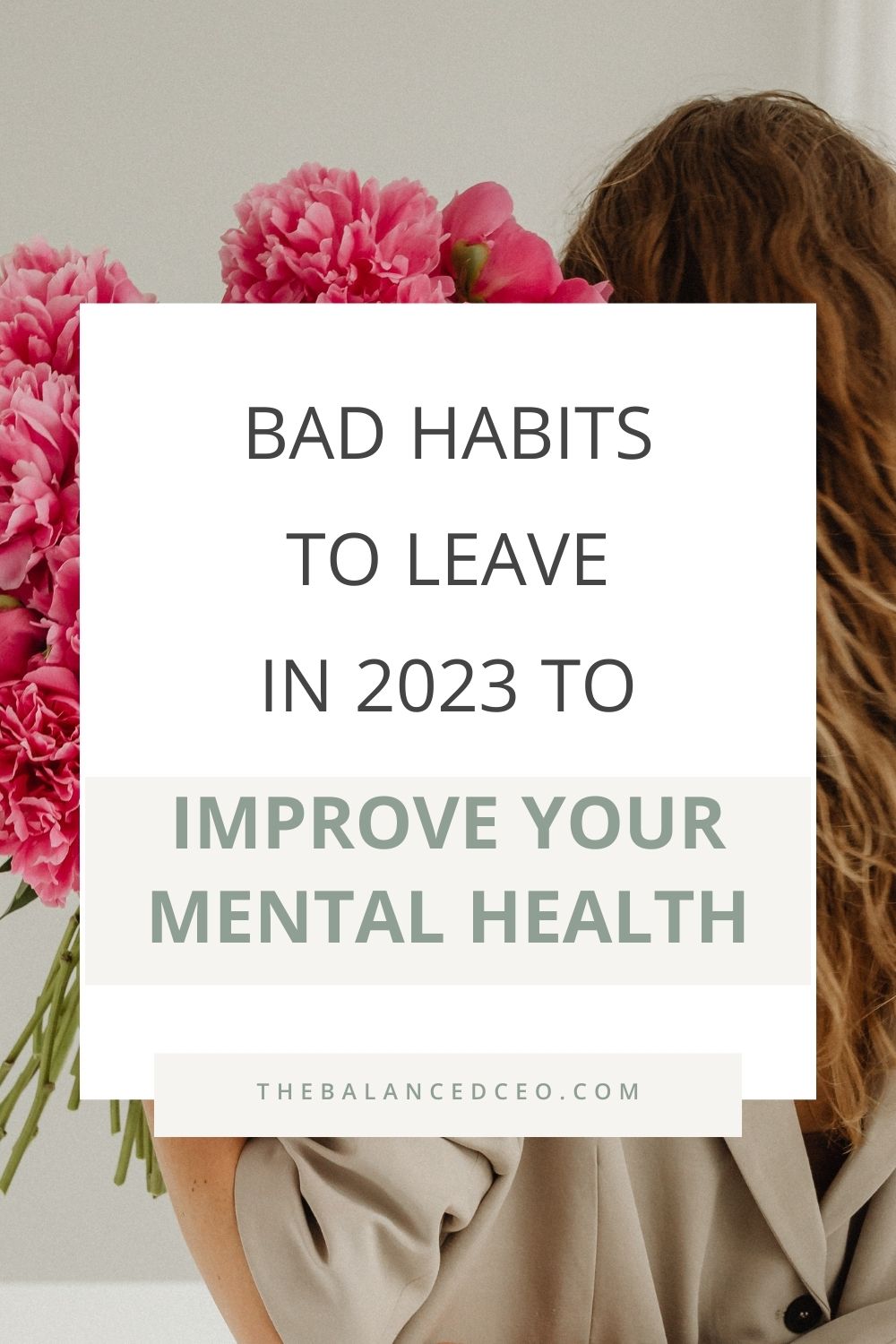This post may contain affiliate links, which means I’ll receive a commission if you purchase through my links, at no extra cost to you. Please read full disclosure for more information.

Old habits die hard, but some of them might be holding back your mental health. Some people do them consciously, while others might have adopted them as acquired behaviors. Either way, it’s best to cleanse your mind of these patterns and focus on what will improve your life and character.
Some may say that turning your life around may be easier said than done. However, recognizing which mannerisms are harmful makes replacing them easier. Here’s a rundown of bad habits and alternative suggestions.
1. Doomscrolling
Doomscrolling is a term that refers to continuously scrolling on your social media feed or news sites and seeing negativity. It can be in the form of troubling headlines, nasty discourse, or a pessimistic status. Unfortunately, there’s plenty of that in the online space.
While negativity is inevitable, it’s best not to expose yourself to it too much. Doomscrolling can worsen a person’s anxiety or depression in the long run. Run a social media cleanse by unfollowing those who only incite stress and engaging with more positive folks.
2. Being Chronically Online
While steering clear of negativity online is a great move, it’s still best to take a break from the digital space occasionally. Being chronically online or having excessive screen time is unhealthy since it can distract you from reality.
So much content may revolve around unrealistic lifestyles or unattainable beauty standards. Some people may develop poor self-esteem when they consume these too-good-to-be-true posts daily. Set time limits on different apps to build up this habit.
3. Skipping the Gym
Skipping a trip to the gym when you don’t feel up for it is OK now and then. However, saying no to exercise every single day can harm your physical health. When your body doesn’t feel good, your mind is also affected by it.
Reframe your viewpoint about physical fitness. About 78% of people believe the gym positively affects their mental health. They cite how physical activity helps them look after their well-being. Thus, seeing exercise as a tool for maintaining your health might be helpful.
4. Staying up Late
Staying up can be a tough habit to leave behind, especially if you experience revenge bedtime procrastination. With so much going on throughout the day, you may force yourself to stay awake throughout the night to catch up on leisure. However, you may have to wake up early the next day.
The average adult needs around seven hours of sleep every night to remain functional. Change how your schedule looks and make time for sleeping. You can also explore other sleep styles, like polyphasic sleeping.
5. Stress Eating and Drinking
Some people use food and alcohol to cope with stress, but it can’t be good for your body to intake copious amounts of food at once. It’s not ideal for your mental health, either. Overeating and drinking can leave you feeling bad about your body or groggy.
The best way to steer clear of stress eating and drinking is to find different ways to relieve the pressure you’re feeling. For instance, meditation can make you more mindful of food options and avoid that initial impulse of overconsumption.
6. Compulsively Shopping
Did you ever feel an urge to buy something and couldn’t help yourself from purchasing it? About 5.8% of American adults deal with a shopping compulsion, so you’re not alone. Treating yourself can be thrilling, but it’s important to have some self-control.
Most compulsive shopping behavior can put you in a tricky situation financially, which can damage your mental health. Record your expenses and budget. Being more responsible with your money management can help you recognize bad purchases and say no.
7. Overcriticizing Yourself
While you may receive criticism from other people, no one is ever as hard on yourself as you are. You might go as far as insulting and reprimanding yourself. It’s crucial to stop this, as putting yourself down can be a toxic trait that leads to depression.
If you notice something bad about yourself, acknowledge it. Afterward, look at ways to better yourself and your actions for next time. Rather than leaning toward self-destruction, focus on self-improvement instead.
8. Suppressing Emotions
Some people don’t like feeling emotions, especially when they happen simultaneously. As a result, they suppress them instead. Unfortunately, compartmentalizing your feelings is a negative coping mechanism.
Letting out your emotions is a great way to process and express your feelings. It’s healthy to do so. You don’t have to publicize every aspect of your feelings, but it can be good to do a bit of self-reflection through journaling or art.
9. Dwelling on the Past
Another unhealthy habit to drop for your mental health is dwelling on the past. It’s very human to experience regret or grief for something that has happened. However, it’s important to move on and live in the present.
Being in the moment doesn’t mean forgetting the past, though. Some people may feel guilty when they try to dismiss the event. If you experience a similar feeling, find peace with the memory. That way, you can recall it without heaviness.
10. Procrastinating
Whether cleaning your room or working on a project, procrastinating can be a habit that’s hard to get away from. However, you can discipline yourself. When a certain task seems troublesome to complete, some people try motivating themselves with a break or reward afterward. You can also coax yourself to work in batches.
11. Overworking
If you aren’t guilty of procrastinating, you might be doing the opposite and overworking yourself. This habit isn’t healthy either, as too much work can overwhelm your mental health. Organize your tasks by priority and work on what you can. When done, give yourself the downtime to recuperate from working so hard.
Another great option is to check out Course Hero where you can get answers & explanations from an expert tutor 24/7 at Course Hero.
12. Turning Away From People
Most people turn away from people out of shyness or introversion. It can be nice to get some alone time, but self-isolating yourself to an extreme can be harmful. It’s essential to reach out and connect with others, especially during tough times when you need to lean on someone. You don’t have to shoulder everything by yourself.
New Year, New Habits
Getting these habits out of your system can take a while, but making the effort can bring you one step closer to that. Allow yourself the time to work on yourself and fortify your mental health to be stronger than ever.

Cora Gold
Contributor
Cora Gold is the Editor-in-Chief of Revivalist magazine, a publication dedicated to happy, healthy, and mindful living.





Leave a Reply